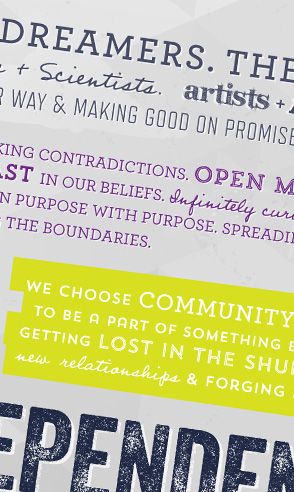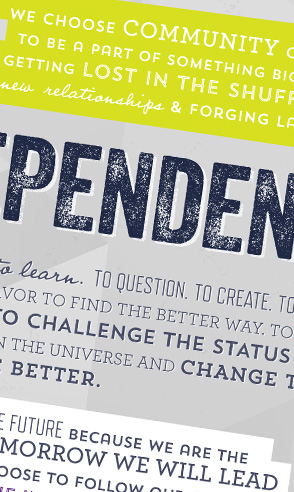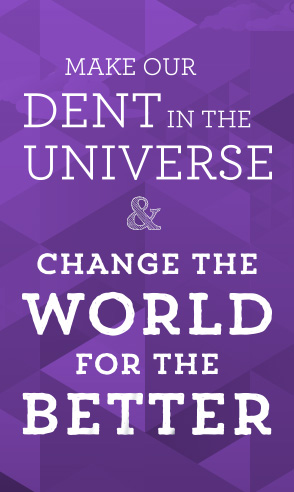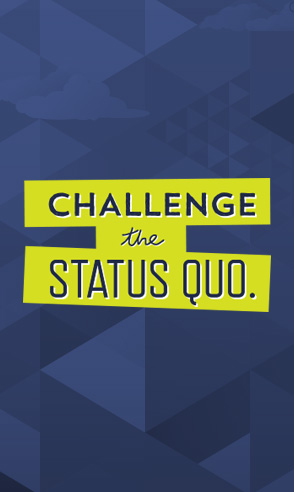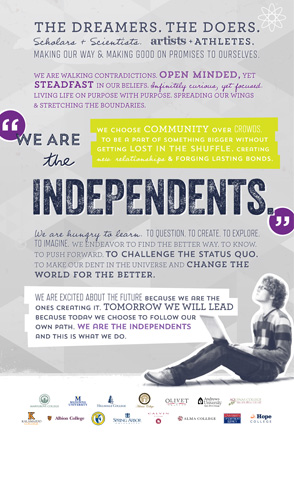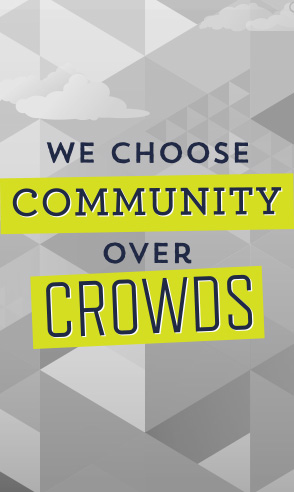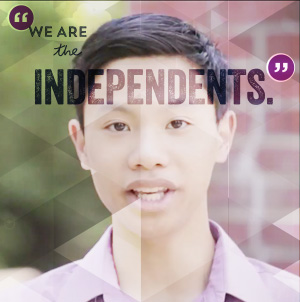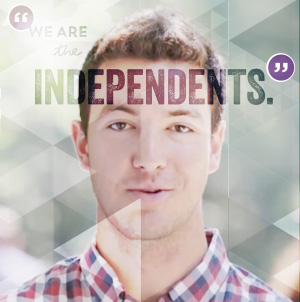Archive for
Make Your College Campus Visits, Virtually
While in-person admissions visits at Michigan’s top 14 private colleges and universities have been canceled due to the coronavirus pandemic, prospective students can still explore these beautiful campuses with the click of a button!
With virtual tours available, you can still get the chance to “walk” the campus, see and feel what life could be like for the next four years. The online tours not only give you a peak into each campus, but many schools even allow you to schedule an online information session with a live admissions counselor! Get your questions answered and make an informed choice now from the comfort of your home.
Get more information in the links below:
Alma College Virtual Tour | Schedule a Virtual Visit
Andrews University Virtual Tour | Sign up for a Virtual Preview
Aquinas College Virtual Tour | Schedule a Virtual Personal Visit
Calvin University Virtual Tour | Schedule a Virtual Visit
Hillsdale College Schedule a Virtual Visit
Hope College Virtual Tour | Schedule a Virtual Visit
Kalamazoo College Virtual Tour | Schedule a Virtual Visit
Madonna University Campus Tour Video | Schedule a Virtual Visit
Siena Heights University Virtual Tour
Spring Arbor University Virtual Tour | Schedule a Virtual Visit
University of Detroit Mercy Virtual Tour | Sign up for a Virtual Information Session
Private Colleges Team Up with Harvard Business School Online to Create Unique Hybrid Learning Program
Michigan Colleges Alliance (MCA) is collaborating with Harvard Business School (HBS) Online to offer students at participating MCA campuses a blended learning program, and an opportunity to earn an HBS Online course credential. In the first phase, nearly 70 students from five MCA member colleges and universities completed the HBS Online’s Sustainable Business Strategy course in the spring.
“When we built this course, one of my hopes was that it could be utilized to educate young people about the important role that business has in tackling some of the challenging issues of our time,” said Harvard Business School Professor Rebecca Henderson . “The students and faculty from the MCA campuses who participated in this pilot are pioneers, and I look forward to seeing how they will apply the learnings from our course in their own communities.”
The participating colleges created a blended learning offering where students registered for the “sustainable business” course led by local faculty and featuring the HBS Online course led by Professor Henderson. Students then applied their learnings through projects with businesses that were facing sustainability challenges, including Wolverine Worldwide, Merrill, Adrian Steel and Thetford Corporation.
“This was by far the most interactive course I have ever taken,” said Mya Oleksiak , a sophomore at Adrian College . “I loved that the modules and field work put me in real-life situations, and the meetings with my professor and classmates tied it all together. It was a privilege to be part of it.”
“This was a huge opportunity to reinforce what I learned as a Sustainable Business major and to take it into the real world,” said Tyson Marsh , a senior at Aquinas College . “The conversations with people in my group, from Bangladesh and Australia , helped me see different ways to apply and approach sustainability, and it is really amazing to be able to help a big global company like Wolverine solve a real sustainability problem.”
“The HBS pilot is a perfect illustration of why MCA has become a national leader in private higher education collaboration,” said MCA President Robert Bartlett . “It embedded content from the most prominent business education brand and a global learning network into existing classes offered by our member campuses. It then connected student classroom experiences to real projects in local communities. This best practice, active pedagogy model has produced tangible outcomes for both students and local businesses throughout the state.”
MCA plans to extend the program with another Sustainable Business Strategy offering in the spring and other HBS Online courses in the future. MCA represents 14 of the top independent colleges and universities in Michigan. Participating colleges included Adrian College, Albion College, Andrews University, Aquinas College, and Spring Arbor University.
When is the best time to visit colleges?
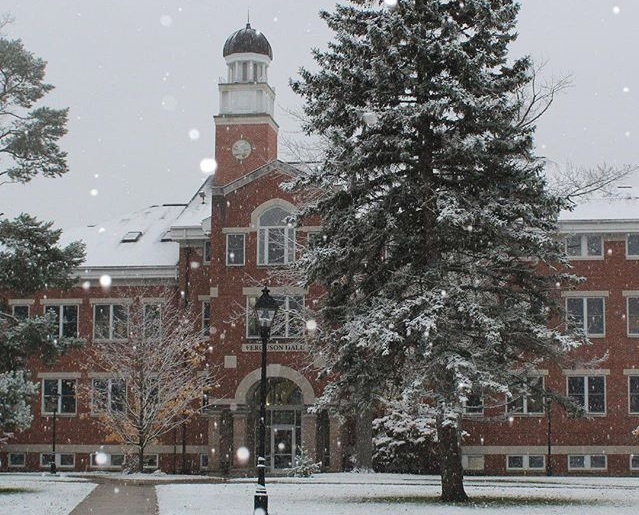
(Albion College, voted 12th Most Beautiful College in Winter)
It’s winter, and the tundra is setting in – at least it is here in Michigan. The last thing you are thinking about is planning a trip to visit campuses. Those long walks across snow-covered quads are certainly less appealing when the temperatures are teetering at the same level as the number of layers you’ll be wearing to stay warm. Or maybe you are a freshman or sophomore, and it’s just “not time yet.”
So, “When is the best time to visit?” The answer may not be what you expect. Here are some tips for getting the most out of campus visits:
Time of year:
As summer strolls in and the school year winds down, families across the country are gearing with plans to visit college campuses. Tours are crowded, staff is minimal, and quads are relatively barren. Although the summer months are more convenient for your time, ideally you should try to plan your visits when classes are in session and the campuses are full of life. Think of it like trying on a pair of new shoes: do you get the proper assessment while sitting? No, you get up, walk around, and perhaps jog in them… as it should also be done visiting campuses. Simulate the day-to-day as if you are attending the school. It doesn’t necessarily mean go in the dead of winter, but consider this: it may be cold, but it’ll also be cold while you attend, won’t it?
Age of student:
It can be very rewarding to visit colleges and universities before your junior and senior year (read: before it’s decision time). You are less concerned about choosing and “buying” when you are simply “window shopping” and more interested in checking out the inventory. Expose yourself to as many different kinds of places—big schools, small schools, research universities, liberal arts colleges, urban campuses, places way out in the country—to develop a broad perspective of all the different options. Then, when it is time to make a decision, you’ll have a better foundation on which to choose.
Before stepping foot on the first campus (and each one after that…):
Your new mantra: Relax, enjoy, decide later. Resist the impulse to judge immediately, good or bad. Your first reaction is bound to be emotional, and usually overly positive—college is really cool! Sleep on it. Weigh your impressions against the other schools you visit and try to remain as objective as possible so your rose-colored glasses don’t allow you to overlook things.
How to choose:
As you visit the campuses, allow your senses to guide you. Really like something? Take note of it. Feel like something’s missing? Take note of it. Gut instinct is usually pretty accurate. Additionally, the perceptions from your visits will come in handy when completing your college applications. Remember this: tying personal experience to the campus environment will blow the minds of the admissions department!
What to look for:
Focus on fit. We perform at our best when we have a level of comfort, belonging, and value. Questions to ask yourself: How does the college meet my academic needs? Will I be challenged appropriately? Is the style of instruction a good match for how I learn? Does the college offer a community that makes me feel “at home?” Does the college offer extracurricular activities that interest me?
After the visit, before you leave:
Connect with the recruiter. Colleges and universities typically assign admissions personnel to different areas of the country for recruiting efficiency. If your area’s recruiter is available, definitely introduce yourself. Either way, get that person’s contact information. Consider him/her as your “go to” person when you have important questions later in the admissions process. And remember this: there is nothing insignificant nor too embarrassing to ask. The admissions staff is there to help!
What to do next:
Record your visit. Make notes as soon as you are able. The more campuses you visit, the more they will begin to blend together, especially from memory. Take pictures to give yourself a visual index of what you’ve seen to avoid confusion later.
And finally:
Enjoy the process. It can be easy to get lost in the excitement and have that energy turn into anxiety. Relax. Start the search early. Visit during the school year to witness the campus’s true environment. Trust your senses and take notes.
As you map your college visit road trip, include a few of Michigan’s top 14 private colleges and universities on your list. These schools are purposefully smaller and emphasize “community over crowds.” Often comparable in cost to Michigan’s public institutions, the independents boast higher four-year graduation rates, outstanding faculty who help students forge their own paths, and smaller class sizes for a truly unique and personal experience.
Be bold. Be different. Go independent.
Your One-Stop, College Admissions Connection: Virtual College Fair
We’ve said it before. The best way to choose your own path is to visit a college campus… or three. Breathe the air. Wander the student center. Sit in on a lecture. Chat up a few professors. Grab a meal in the dining hall. Stroll through the quad.
But the college search doesn’t usually start with a visit to campus. You might begin by looking at websites or admissions booklets, or attending a college fair to learn more. Pixels and pages are a start, but nothing beats talking to a person, and college fairs can be time consuming to attend. Now, there’s a solution!
Enter the Virtual College Fair. It’s never been easier to connect with a college admissions office and get your big questions answered.
The Virtual College Fair offers free access to video recordings and live streams from Michigan’s top private colleges and universities. Watch the recordings, pick your favorites (or pick them all!), and then register – individually or with your family – to attend a live and interactive web-based Q&A session with admissions and other college representatives. Learn more here.
Like what you hear? Reach out to the college to continue the conversation and maybe even schedule a visit!
Upcoming Live Q&A Sessions
December 4, 2018 at 7 PM: Alma College
December 4, 2018 at 8 PM: Aquinas College
December 5 , 2018 at 7 PM: Madonna University
December 6, 2018 at 7 PM: University of Detroit Mercy
December 6, 2018 at 8 PM: Calvin College
December 11, 2018 at 7 PM: Albion College
December 12, 2018 at 7 PM: Spring Arbor University
December 13, 2018 at 7 PM: Hillsdale College
Kalamazoo Promise Makes Private Education Within Reach
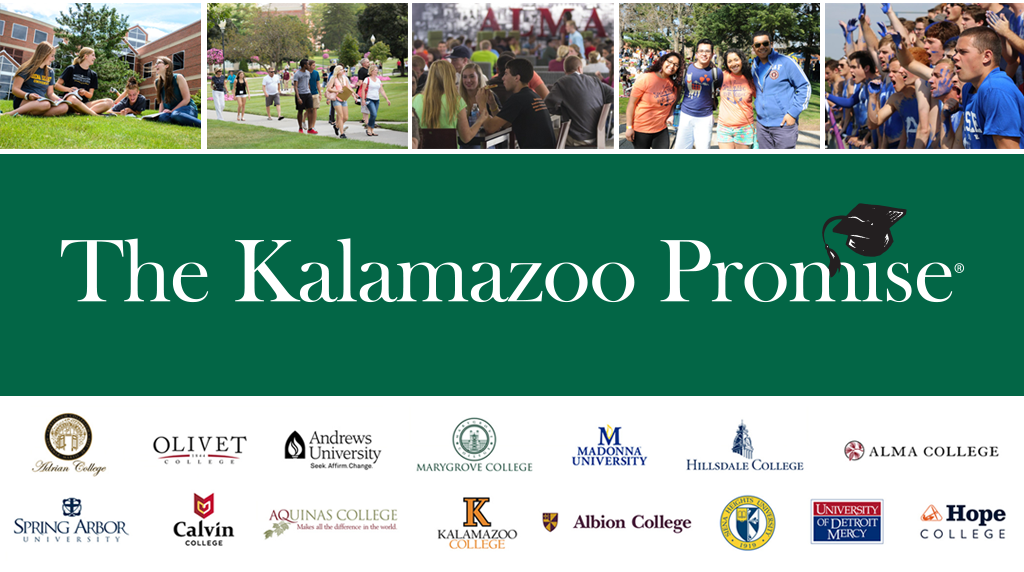
Almost everyone nowadays can cite scary statistics when it comes to the cost of college education.
Nationwide, the average annual tuition at private schools has more than tripled in 30 years jumping to $32,405 this year, according to inflation-adjusted statistics from the College Board.
But the cost of an elite private school education is nothing for students in Kalamazoo public schools.
You read that right.
The cost of Michigan’s 15 independent colleges and universities is zero for students who graduated from Kalamazoo Public Schools and attended since kindergarten. Graduates who attended since at least seventh grade will receive 75 percent of their tuition.
The Kalamazoo Promise is a revolutionary program that is changing lives and putting college in reach for 5,000 eligible graduates since it was launched and funded by anonymous donors in 2005.
The schools now send 85 percent of students to college, whose graduates can expect to earn $1 million more over their lifetime than peers whose education stopped at high school.
And what an education they can get, especially at Michigan’s independents: Adrian College, Albion College, Alma College, Aquinas College, Calvin College, Hillsdale College, Hope College, Kalamazoo College, Marygrove College, Olivet College, the University of Detroit Mercy, Andrews University, Madonna University, Siena Heights University and Spring Arbor University.
The schools pride themselves on helping students forge their own path. Classes are taught by professors, not teaching assistants, with average class sizes of just 17.5 students.
The independents open doors to a host of careers, from business and engineering to education and nursing, supported by a nurturing network of alumni who have become leaders in their fields.
And the independent colleges look like the world around them. One in 4 students at Michigan private colleges and universities is African American, American Indian, Asian, Hispanic or Latino.
Be bold. Be different. Go independent.
Alumni Flock for Coda of Spring Arbor Prof’s Career
There’s a great line for anyone who plays or appreciates music in the ‘90s movie “Mr. Holland’s Opus.”
“It’s about heart. It’s about feelings. Moving people and something beautiful,” Glenn Holland, a high school music teacher, tells his class.
“It’s not about notes on a page. I can teach you notes on a page. I can’t teach you that other stuff.”
Chuck Livesay taught both for 41 years at Spring Arbor University, directing choirs at the college and touching countless lives. Only about a quarter of the students in his choirs actually majored in music, but Livesay struck all the right chords.
“I really can’t think of anything else I would be doing, other than music. It’s been a passion,” Livesay told SAU in MLive.
So, as they did for the Richard Dreyfuss character in “Mr. Holland’s Opus,” old students of Chuck Livesay came from near and far for his last concert.
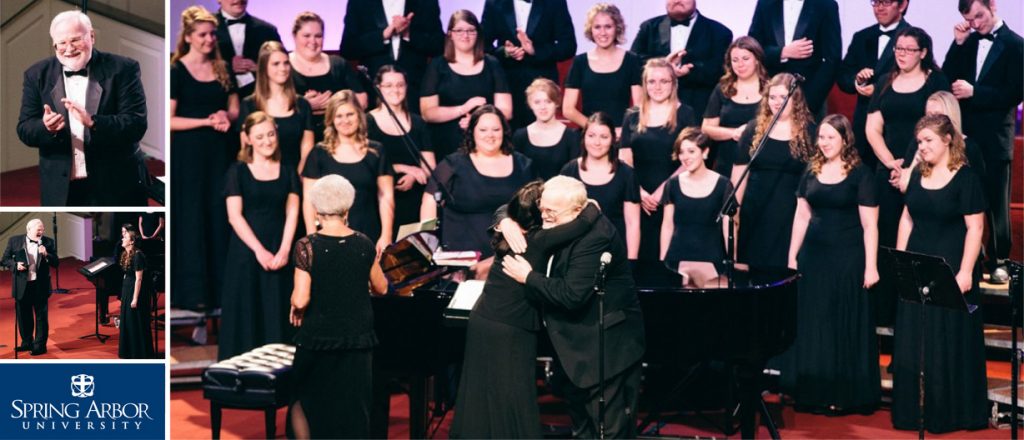
Seventy-one alumni came from as far as Texas for the last performance in May, which Livesay called a highlight of his career.
All came up and sang two songs at the end of the concert. They knocked it out of the park after all those years.
What made Livesay different? Why would so many want to thank him one last time?
“(Students said) we could tell as you worked with us that you were very passionate about the music. It really touched you in a deep way and it helped to touch us in a deep way,” Livesay said.
Passion. Community. Dedication. Bonds that last a lifetime. That’s the difference at Spring Arbor University and Michigan’s other top 15 private colleges and universities.
Livesay only planned to stay at Spring Arbor for two years. He made it a career. That’s not unusual because it’s easy to fall in love with Spring Arbor and the other independents.
Unlike big state schools, class sizes are small and taught by incredible faculty who help students forge their own path.
They have a deep and committed network of alumni who help after graduation. It’s an experience that simply isn’t available at traditional universities.
And despite what you may have heard, independents are often less expensive and boast higher four-year graduation rates than four-year institutions.
Be bold. Be different. Go independent.
Michigan Private Colleges Rank High in Social Mobility
Study after study has shown that college not only transforms minds, but it lives as well as wallets.
College graduates make 25 percent more per week than the national average, and unemployment rates are significantly lower the more education is attained, according to the Bureau of Labor Statistics.
In short, college is “a ticket to the middle class,” according to Bridge Magazine.
But getting admitted to one and finishing are two different things, and it’s no secret that some colleges do far better jobs of helping low-income students graduate and get jobs.
The online magazine analyzed federal data to rank colleges on how they promote social mobility — offering tuition breaks, mentors and other aid for low-income students, as well as how long it took them to narrow the income gap with rich students after graduation.
The results? Michigan’s small, private colleges ranked the near the top.
Adrian College was the top-ranked private college in the state, enrolling the seventh-highest percentage of low-income students and graduating nearly 60 percent of them.
Madonna University was not far behind, offering low tuition for low-income students (less than $9,000) and helping them make similar salaries with high-income students 10 years after enrollment.
Olivet College and Spring Arbor University were near the tops in enrolling poor students, while Alma College, Hope College and Calvin College ranked in the top six in graduation rates.
Kalamazoo College, inexplicably, was left out of Bridge’s analysis altogether. But using its metrics, would have scored in the top 10 for graduation rates and average earnings.
The rankings reflect a deep commitment by Michigan’s top 15 private colleges and universities to improving the lives of all students and offering a path to improve lives.
Contrary to popular belief, tuition is on par with many public universities. That’s because students receive far more financial aid. At most of our schools, more than 93 percent receive aid, bringing the cost of a world-class education within reach.
Students at Michigan’s independents typically graduate in four years, rather than five or six at public schools. That means they are earning a salary while their peers at big state universities are wracking up more student debt.
That also means they have a two-year head start on their careers, which is yet another way Michigan independents help students forge their own path.
Be bold. Be different. Go independent.
Holidays are About Tradition at Michigan’s Top 15 Independent Colleges
Holidays are all about tradition. And big state schools certainly have their own. Unfortunately, they often go something like this: Cram for finals, throw dirty clothes in a bag and say hurried goodbyes to your dorm mates before hopping in a car and leaving town.
Michigan’s independent colleges and universities do things a bit different. And they’re proud of that. Built around community and cohesion, the schools embrace all the wonder and tradition the holiday season has to offer, from choir concerts and campus sing-alongs to tree decorating parties.
At Hope College, students and community members have gathered for eight decades for Christmas Vespers. The first event was held just hours before the Japanese bombed Pearl Harbor on Dec. 7, 1941, and held every year since. That first year, 500 people came. It’s grown every year since to the point where people start inquiring in August about tickets for the choir and symphony concert.
For more than 40 years, Albion College has gathered for the Festival of Lessons and Carols, which features several choirs and intersperses carols with readings that trace Biblical history. For decades, the popular event has begun with “Once in Royal David’s City” and ended with a candlelit rendition of “Silent Night.”
For 22 years, Alma College’s Festival of Carols gathers 110 members of the Glee Club, College Chorale and Alma Choir for carols and candle lighting to commemorate both Christmas and Hanukkah.
Spring Arbor University’s Hanging of Greens has brought the campus and community together for 15 years, with an event that includes caroling, tree-lighting, hot chocolate and horse carriage rides.
A new tradition continues at the University of Detroit-Mercy, which produced a live version of holiday classic “It’s a Wonderful Life” for the second time this month. The twist is the play is produced as a radio show, featuring a handful of actors playing dozens of characters in the Frank Capra classic before a live audience.
At Aquinas College, the college gathers every year to light a Christmas tree that was planted in 2010 by the Student Senate to reflect the school’s commitment to the environment.
Sound like a lot? We’re just getting started.
Kalamazoo College has celebrated BachFest Christmas, a concert of the famed composer, for every year since 1970. Calvin College has the Sleigh Ride Around the World, which combines Yuletide movies projected on the big screen with Christmas classics from the college’s Wind Ensemble.
We could go on and on.
Adrian College organizes a campus wide party. Marygrove University, Siena Heights and Olivet College host a Christmas concert. Andrews University has a tree-lighting and Christmas concert.
Madonna University puts on the “Christmas Carol” play. Hillsdale College has both a concert and annual Christmas video from its president.
Some of the events may seem similar, but what makes them different – and so special – is that they’ve become part of the fabric of the individual communities around them.
That’s because Michigan’s 15 independent colleges and universities are enmeshed in their cities and towns and realize that college is about experience almost as much as it is about learning.
National leaders in education, the schools emphasize community over crowds and a spirit of togetherness and cohesion that just doesn’t exist at big state schools.
With low class sizes and award-winning faculty, the schools are proud that students forge lifelong bonds with professors.
Often less expensive than public institutions, the independents boast higher four-year graduation rates for a truly unique and affordable experience.
Be bold. Be different. Go independent.
Spring Arbor University Brings Together Community for Christmas
The lights dim. The choir builds to a crescendo. The unmistakable smells of the season fill the air, from Christmas firs to hot cocoa and roasted almonds.
A scene from Norman Rockwell or “It’s a Wonderful Life”? Not quite.
It’s the “Hanging of the Greens,” which in 15 years has become a cherished tradition at Spring Arbor University.
Every year, the close-knit independent college in southern Michigan gathers for the free event. Every year, it gets a little bigger. But it still maintains that small-town feel that’s made it so beloved.
“It’s been incredibly successful and I’m always shocked in a wonderful way in how many people come out from the community,” Sarah Crane, special events coordinator for the president’s office of Spring Arbor, told MLive.
“It’s a huge sign of success when people are posting it on their calendars and are looking forward to it.”
This year’s event begins Friday at 7 p.m. with a Christmas concert, performed by university students, at Spring Arbor Free Methodist Church.
Afterward, University President Dr. Brent Ellis will lead a candle-lighting ceremony, Christmas carol sing-along and fireworks sponsored by American 1 Credit Union.
The event includes an 8:30 p.m. reception at the Student Life Center that includes cookie decorating, cocoa, balloon animals and a visit from Santa Claus. The night also includes horse-drawn Christmas wagon rides through campus and a biannual exhibit of the best student artwork this semester at the Ganton Art Gallery.
Bonus: It’s free.
Because you can’t put a price on community and togetherness, especially during the holidays. That’s especially true at Spring Arbor and Michigan’s top 15 independent colleges and universities.
National leaders in education, the schools recognize that college is about experience. All emphasize community over crowds and a spirit of togetherness and cohesion that just doesn’t exist at big state schools.
With low class sizes and award-winning faculty, the schools are proud that students forge lifelong bonds with professors.
Often less expensive than public institutions, the independents boast higher four-year graduation rates for a truly unique and affordable experience.
Be bold. Be different. Go independent.
Gospel star Babbie Mason returns to alma mater Spring Arbor
World-renowned gospel singer Babbie Mason is returning to Spring Arbor University for a concert Friday. It’s the latest performance in a remarkable pairing that’s benefited both over the years.
“I’m always excited to come back to the Arbor,” she told MLive.
“My dad graduated from there, my brother graduated from there. It’s home.”
An alumna who graduated in from Spring Arbor in the 1970s, Mason returns regularly for concerts and special events such as free workshops.
Friday’s concert benefits the Babbie Mason Minority Music Scholarship, which helps fund tuition for aspiring singers and performers.
Like other events, Mason is incorporating her Spring Arbor family and will be joined by the university’s choir, orchestra and jazz band. Tickets are $10 for general admission and $4 for students.
Mason grew up in Jackson, Michigan, where she went to high school with NFL coaching legend Tony Dungy. Her family was deeply steeped in religion and music. And the passion hit her early: Her father was a pastor and, from an early age, she accompanied him on piano.
Her career has taken her around the world and won her acclaim. Mason has twice won the Gospel Music Association’s Dove Award and has been nominated for Grammies. She’s sung for Presidents Carter, Ford and Bush and is a member of the Christian Music Hall of Fame.
Mason speaks at women’s conferences throughout the nation and has written books about faith.
But no matter the acclaim or fame, Mason’s path always finds her way back to Spring Arbor.
It’s a bond typical of the unique relationships among alumni and Michigan’s top 15 independent colleges and universities.
The schools stress community over conformity, with small class sizes that allow students to work closely with professors committed to helping them forge their own path.
It’s an experience that simply isn’t available at traditional universities. And despite what you may have heard, independents are often less expensive and boast higher four-year graduation rates than four-year institutions.
Be bold. Be different. Go independent.




